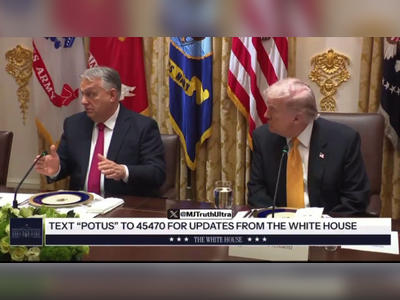United States Repatriates 177 Venezuelan Migrants from Guantanamo
The repatriation, requested by Venezuelan authorities, signifies increasing cooperation between Caracas and Washington.
On February 20, 2025, the United States repatriated 177 Venezuelan migrants from its naval base at Guantanamo Bay, Cuba, with a brief stop in Honduras.
This action followed a request from the Venezuelan government and marks a notable instance of cooperation amidst a historically strained relationship between the two nations.
This latest repatriation adds to the 190 migrants that were returned to Venezuela just ten days earlier, part of a broader strategy of mass expulsions initiated by the Trump administration during his return to power.
Upon arrival in Venezuela, some of the returned migrants expressed their relief, with one stating, 'Thank you!' and another addressing Diosdado Cabello, the Venezuelan Interior Minister, who welcomed them with the words, 'Welcome to the homeland.'
The flight, operated by the Venezuelan state airline Conviasa, had departed from Honduras, where another American aircraft transporting detainees arrived from Guantanamo Bay, which is known for holding approximately thirty individuals accused of terrorism-related offenses.
All of the migrants repatriated in this most recent flight were male, many were wearing masks along with grey sports outfits and slip-on shoes.
They were greeted by a line of military personnel as they disembarked from the aircraft, and notably, none were handcuffed.
Cabello informed the media that those returned were primarily Venezuelans who had been detained at Guantanamo.
He also indicated the likelihood of another flight for additional expelled migrants later that week.
Diplomatic relations between Venezuela and the United States were severed in 2019 during Trump’s first term, which was marked by a concerted international effort to undermine Venezuelan President Nicolás Maduro through sanctions.
While the official stance of Washington continues not to recognize Maduro following his controversial re-election, recent dialogues have been initiated that focus on migration and the release of American detainees in Venezuela.
In early February, U.S. authorities confirmed the transfer of ten members of the Venezuelan gang 'Tren de Aragua' to Guantanamo, where facilities accommodating 30,000 beds have been established for migrants.
This organization has been designated as a terrorist group by both the United States and Canada.
The Venezuelan government indicated that if any of the repatriated individuals were found to be involved in criminal activities as defined by their laws, appropriate legal actions would be taken.
The government also stated that the gang 'has been dismantled' within Venezuela.
Efforts to combat illegal immigration have intensified under the Trump administration, characterized by mass expulsions and raids across several cities in the U.S., alongside the suspension of humanitarian programs initiated by his predecessor, Joe Biden.
This has been supported by various Central American nations, such as Panama and Costa Rica, which have agreed to host individuals expelled from the U.S. before they are fully repatriated.
Recently, Costa Rica reported the arrival of 135 migrants, including 65 children, expelled from the U.S. who are en route back to their countries.
The Vice Minister of the Interior of Costa Rica, Omer Badilla, stated that none of these migrants had criminal records.
This repatriation process has been described as part of a broader 'externalization of borders' strategy, wherein the U.S. delegates the complexities of migrant repatriation to third countries.
Migrants who are sent to Central America typically originate from nations that do not accept repatriation flights or have strained relations with the U.S.
Among the 299 individuals who arrived in Panama the previous week were citizens from countries including Iran, China, Afghanistan, Pakistan, India, Uzbekistan, Turkey, Nepal, Sri Lanka, and Vietnam.
The arrangements with Venezuela facilitated the entry of two Conviasa aircraft into U.S. airspace to facilitate the recovery of the initial group of 190 Venezuelans.
The Honduran government clarified that its involvement in the recent transfers did not position it as a 'safe third country' or a 'bridge' for U.S. expulsions, emphasizing that it was strictly a 'transfer,' where migrants 'change planes and continue' to their home countries without staying in shelters in Honduras.
This action followed a request from the Venezuelan government and marks a notable instance of cooperation amidst a historically strained relationship between the two nations.
This latest repatriation adds to the 190 migrants that were returned to Venezuela just ten days earlier, part of a broader strategy of mass expulsions initiated by the Trump administration during his return to power.
Upon arrival in Venezuela, some of the returned migrants expressed their relief, with one stating, 'Thank you!' and another addressing Diosdado Cabello, the Venezuelan Interior Minister, who welcomed them with the words, 'Welcome to the homeland.'
The flight, operated by the Venezuelan state airline Conviasa, had departed from Honduras, where another American aircraft transporting detainees arrived from Guantanamo Bay, which is known for holding approximately thirty individuals accused of terrorism-related offenses.
All of the migrants repatriated in this most recent flight were male, many were wearing masks along with grey sports outfits and slip-on shoes.
They were greeted by a line of military personnel as they disembarked from the aircraft, and notably, none were handcuffed.
Cabello informed the media that those returned were primarily Venezuelans who had been detained at Guantanamo.
He also indicated the likelihood of another flight for additional expelled migrants later that week.
Diplomatic relations between Venezuela and the United States were severed in 2019 during Trump’s first term, which was marked by a concerted international effort to undermine Venezuelan President Nicolás Maduro through sanctions.
While the official stance of Washington continues not to recognize Maduro following his controversial re-election, recent dialogues have been initiated that focus on migration and the release of American detainees in Venezuela.
In early February, U.S. authorities confirmed the transfer of ten members of the Venezuelan gang 'Tren de Aragua' to Guantanamo, where facilities accommodating 30,000 beds have been established for migrants.
This organization has been designated as a terrorist group by both the United States and Canada.
The Venezuelan government indicated that if any of the repatriated individuals were found to be involved in criminal activities as defined by their laws, appropriate legal actions would be taken.
The government also stated that the gang 'has been dismantled' within Venezuela.
Efforts to combat illegal immigration have intensified under the Trump administration, characterized by mass expulsions and raids across several cities in the U.S., alongside the suspension of humanitarian programs initiated by his predecessor, Joe Biden.
This has been supported by various Central American nations, such as Panama and Costa Rica, which have agreed to host individuals expelled from the U.S. before they are fully repatriated.
Recently, Costa Rica reported the arrival of 135 migrants, including 65 children, expelled from the U.S. who are en route back to their countries.
The Vice Minister of the Interior of Costa Rica, Omer Badilla, stated that none of these migrants had criminal records.
This repatriation process has been described as part of a broader 'externalization of borders' strategy, wherein the U.S. delegates the complexities of migrant repatriation to third countries.
Migrants who are sent to Central America typically originate from nations that do not accept repatriation flights or have strained relations with the U.S.
Among the 299 individuals who arrived in Panama the previous week were citizens from countries including Iran, China, Afghanistan, Pakistan, India, Uzbekistan, Turkey, Nepal, Sri Lanka, and Vietnam.
The arrangements with Venezuela facilitated the entry of two Conviasa aircraft into U.S. airspace to facilitate the recovery of the initial group of 190 Venezuelans.
The Honduran government clarified that its involvement in the recent transfers did not position it as a 'safe third country' or a 'bridge' for U.S. expulsions, emphasizing that it was strictly a 'transfer,' where migrants 'change planes and continue' to their home countries without staying in shelters in Honduras.









